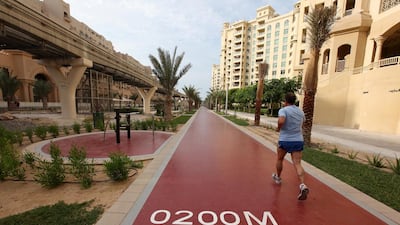DUBAI // Half of all women and a third of all men in the region do not exercise enough, a conference of health experts has heard.
Studies by the World Health Organisation (WHO) found that its Eastern Mediterranean Region, of which the UAE is part, was second only to the Americas in terms of low activity rates.
At the Move for Health regional forum in Dubai, Dr Ala Alwan, regional director for WHO, said that lack of exercise was the fourth leading risk factor for non-communicable diseases, ranking higher than obesity,
He said inadequate amounts of exercise were responsible for 27 per cent of diabetes, 30 per cent of heart disease and up to a quarter of breast and colon cancer cases.
Officials and experts from more than 20 countries attended the event for promoting physical activity, which started in Dubai on Monday.
“The data from our region shows a wide and indeed alarming range of physical activity,” Dr Alwan said.
Physical inactivity is as serious a public-health problem as high blood pressure, high blood-glucose levels and tobacco use, he said.
Generally, experts recommend 30 minutes of exercise a day as the minumum required to stay healthy.
During the programme, speakers from various countries in the region presented their experiences with programmes to promote this level of physical activity.
Ahmed Al Sharif, secretary general of Dubai Sports Council, said initiatives such as the Dubai Pulse programme had helped to increase the number of adults taking part in regular exercise to 41.9 per cent.
“Our objective by the end of 2015 is to have more than 45 per cent of the population engaged in physical activity on a regular basis,” he said.
Mr Al Sharif echoed other speakers at the conference who argued that collaboration between ministries, municipalities, urban planners, media and sports societies was key to encouraging physical activity.
“Nowadays we cannot succeed without this kind of integration,” he said.
Lack of common understanding of physical activity, lack of political commitment, the climate and outdated infrastructure are among the causes of the region’s high rates, said Jasem Ramadan, physiology professor in the faculty of medicine at Kuwait University.
Other reasons given for the high rate of inactivity included the long distances travelled for work and the restrictive nature of traditional clothing.
Lack of planning and research at a government level was also mentioned.
The WHO officials surveyed 22 countries in the region to assess their programmes on physical activity, but only 14 had responded by the time of the conference, said Haifa Madi, Eastern Mediterranean director of health protection and promotion. Of those, five had national coordinating committees to address physical activity and seven had no committee.
“Clearly most countries do not have national policies,” Dr Alwan said. “Not all government sectors are engaged and not all government sectors have made physical activity a priority on their agendas.”
Leadership commitment was needed at the highest levels, said Dr Tawfik Khoja of Saudi Arabia, director general of the GCC Health Ministers’ Council.
“I see only a few ministers here with us,” Dr Khoja said.
The two-day conference at the InterContinental Dubai Festival City covered topics including developing national plans for physical activity, international and regional initiatives and ways to mobilise media support.
Dr Alwan and Abdul Rahman Al Owais, Minister of Health, opened the conference. Princess Haya bint Al Hussein, wife of the Prime Minister and Ruler of Dubai, was scheduled to speak but did not attend.
Officials from countries including Lebanon, Iran, Egypt, Iraq, Djibouti, Morocco, Qatar, Bahrain and Oman attended, while policy planners from the US, Brazil, Australia and the UK made presentations.
lcarroll@thenational.ae

